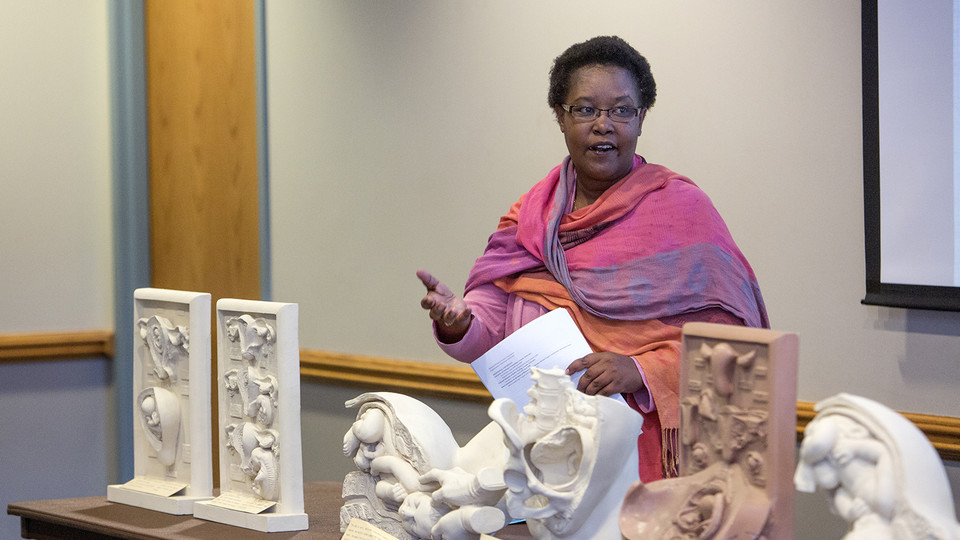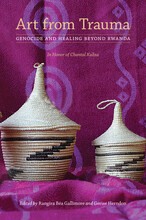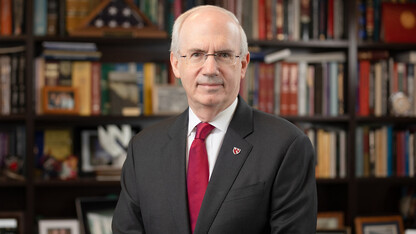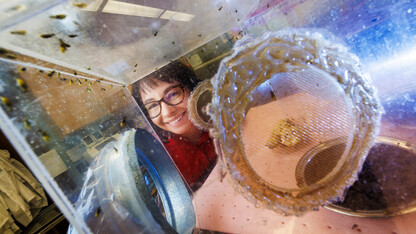· 4 min read
Kalisa’s life, work honored by new book

When Chantal Kalisa died suddenly after a brief illness Dec. 18, 2015, many in her orbit were stunned.
Priscilla Hayden-Roy, then interim chair of the Department of Modern Languages and Literatures, recalled conversing with Kalisa over email just a few days prior to her death. Ever the scholar and teacher, Kalisa, associate professor of French and director of Women’s and Gender Studies, had kept herself busy while hospitalized grading end-of-semester papers.
“It absolutely came out of the blue that she was ill, and then irretrievably ill,” Hayden-Roy, now associate dean for faculty in the College of Arts and Sciences, said. “It was completely unexpected and we felt shell-shocked.”
Despite their overwhelming grief, a small group of colleagues and friends pressed forward to memorialize Kalisa’s life and work. Their endeavor has come to fruition, with the publication of “Art from Trauma: Genocide and Healing Beyond Rwanda,” due from the University of Nebraska Press in August. The cover bears the epitaph “In honor of Chantal Kalisa.”
The book is an anthology of essays that spans the intimate — the lessons learned from Kalisa, written by both colleagues and former students — to the interpretive, with a critical focus on the uses of art, theater and literature as outlets for healing from violence.
Following input from fellow scholars, friends and family, the effort was led by Kalisa’s long-time collaborators Gerise Herndon, professor of English at Nebraska Wesleyan, and Rangira Béa Gallimore, associate professor emerita of French at the University of Missouri.
“We decided to create this book in order to continue the conversations she’d been having through her research, teaching and outreach,” Herndon said.
Kalisa had spent much of her life as an amplifier for the voices of survivors of violence. She had a personal connection to mass violence, and described herself as a “child of exile.” Kalisa was raised by parents who were exiled from Rwanda prior to the genocide that occurred there in 1994 and claimed a million lives, including many of her relatives.
Her academic work in global women’s rights, transnational feminism, women’s literature, African colonial and post-colonial violence against women, and Rwandan genocide produced knowledge while also allowing survivors to tell their own stories.
In 2013, Kalisa was invited to speak at the 19th Commemoration of the Genocide against Tutsi, organized by the Rwandan Embassy in Washington, D.C. She spoke about the importance of personal testimony in the historical narrative of the events. It was this overarching message that guided the co-editors as they put the anthology together.
“We wanted to make sure that we included essays that addressed what was most important to Chantal: elevating the voices of survivors and healing from trauma,” Herndon said.
Following a call for submissions in March 2016, Herndon said more than 40 essays were received from around the globe. The finished book of 16 essays touches on the Nazi-led genocide, specifically experiences of the Roma, violence in Tunisia, African-American history, war in Bosnia and the experiences of immigrants here in the United States.
“The essays deal with various kinds of trauma, because the focus of her scholarship was on violence, trauma and healing through artistic expression,” Herndon said. “She studied mass atrocities, as well as intimate partner violence, and looked at how that violence was addressed in literary expression and theater. We expanded the focus to include other art forms as therapy for healing from trauma.”
Hayden-Roy and Patricia A. Simpson, who joined the department as a professor of German in 2016 and served as department chair from 2016 to 2019, helped shepherd the book by finding funding and maintaining contact with the Press and the editors throughout the project.
Simpson also wrote the foreword for the book, after immersing herself in Kalisa’s work.
“I wrote the foreword, trying to bring together the more personal reminiscences and the more scholarly contributions. They reflect the importance of doing the work of mourning through language, literature and art. I wanted to acknowledge the capacity of language to do harm, and emphasize instead the capacity of language to heal,” Simpson said. “It was my modest tribute to [Dr. Kalisa’s] life and work.”
Kalisa’s colleagues, including Isabel Velasquez, associate professor of Spanish, and Iker González-Allende, Leland and Dorothy Olson Professor of Spanish, also contributed to the project.
“It really turned out to be a wonderful collaboration with the University of Nebraska-Lincoln,” Herndon said.
In addition to the book, which is available for pre-order from the University of Nebraska Press, a memorial scholarship fund has been established at the University of Nebraska Foundation to honor Kalisa.








